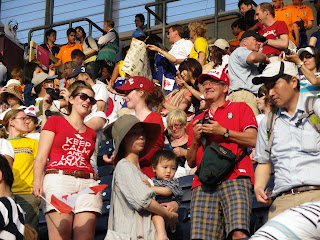I’m looking out at the massive flock of redpolls on our two
birdfeeders. Occasionally pine siskins, a woodpecker,
a few bluejays, a few pine grosbeaks, a squirrel and the odd raven and magpie
join in. Sometimes there are other birds I cannot name. At -36C, the activity
in our otherwise dead still back yard is impressive.
“Everyone acts in self-interest,” a friend said to me a while
back. “It’s what motivates everyone.” He
said it with certainty. Like it was a fundamental truth of the universe. Fundamental
like gravity. So fundamental you would be a fool not to recognize it.
If self-interest is the prime human motivator, what inspires
my husband to feed these little creatures every winter? Is it just because he
likes looking at birds? Or is it something more?
All around me I see people donating their time and money to
help others. They shovel their neighbours' walks. They help the homeless. They take in stray dogs. They raise money for charities. They sit
on committees. They promote the arts and lobby to protect the environment. They perform a myriad of tiny anonymous tasks to make people's lives better.
During and after the Slave Lake fires, hundreds of people helped
one another. They helped each other get out of town. They warned their neighbours to get out, adding
precious minutes to their own escape. They let others into the line of escaping
cars even though it might put themselves in danger. Some filled their cars with
total strangers instead of their own possessions. They took people in, fed them
with their own food, shared their own homes, donated their own money, time and
possessions- all without thought of compensation or return on investment.
 |
| Escaping the Slave Lake fires. |
I guess people like my friend might say people do these things because
their actions make them feel better about themselves. Their behaviour might give them a sense of
community and shared purpose and belonging. But is that the same as self-interest?
Well. It just isn't.
Is human motivation universal? Is it instinctive? Do we all
act for the same reasons?
I say we don’t.
And we don’t because we do not all have the same values. We
were not all raised the same way. We do not all have the same experiences or
beliefs. We might all be held to earth by the force of gravity but our actions
on this planet are not all motivated by the same influences and morals.
Apart from a basic instinct for survival and perhaps -some
might say - procreation, are we all motivated primarily by the desire to make
ourselves rich and self-satisfied? There
is clearly such a thing as selflessness that motivates many people.
So I think my friend is wrong.
Self-interest may be what motivates some people, but you are
a fool to think it is what motivates everyone.





